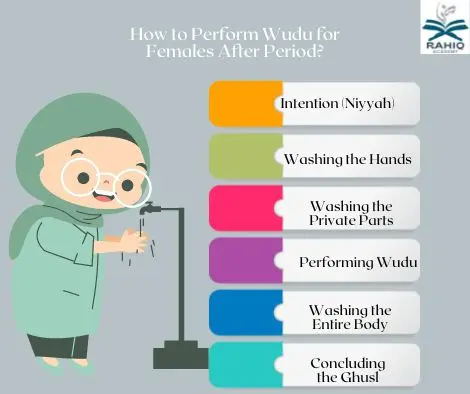Wudu (وضوء) is a fundamental purification ritual in Islam required before performing acts of worship, such as Salah (prayer) and Quran recitation. For women, understanding the proper method of performing Wudu, its benefits, and the rulings that pertain to it is essential for maintaining both spiritual and physical purity. This comprehensive guide covers all aspects of Wudu for females, including its virtues, the correct steps, how to perform Wudu for females after menstruation, what invalidates Wudu, and how to handle doubts about breaking Wudu.
Virtues and Benefits of Wudu
Wudu is not only a physical act but also a profound spiritual purification that offers numerous benefits:
Forgiveness of Sins
Performing Wudu regularly purifies a person from minor sins. The Prophet Muhammad (ﷺ) said:
إِذَا تَوَضَّأَ الْعَبْدُ الْمُسْلِمُ، أَوِ الْمُؤْمِنُ فَغَسَلَ وَجْهَهُ، خَرَجَ مِنْ وَجْهِهِ كُلُّ خَطِيئَةٍ نَظَرَ إِلَيْهَا بِعَيْنَيْهِ مَعَ الْمَاءِ، أَوْ مَعَ آخِرِ قَطْرِ الْمَاءِ، فَإِذَا غَسَلَ يَدَيْهِ خَرَجَ مِنْ يَدَيْهِ كُلُّ خَطِيئَةٍ كَانَتْ بَطَشَتْهَا يَدَاهُ مَعَ الْمَاءِ، أَوْ مَعَ آخِرِ قَطْرِ الْمَاءِ، فَإِذَا غَسَلَ رِجْلَيْهِ خَرَجَتْ كُلُّ خَطِيئَةٍ مَشَتْهَا رِجْلَاهُ مَعَ الْمَاءِ، أَوْ مَعَ آخِرِ قَطْرِ الْمَاءِ، حَتَّى يَخْرُجَ نَقِيًّا مِنَ الذُّنُوبِ
“When a Muslim or a believer washes his face in the course of Wudu, every sin which he contemplated with his eyes will be washed away from his face with the water, or with the last drop of water; when he washes his hands, every sin which they committed will be washed away; and when he washes his feet, every sin towards which his feet walked will be washed away with the water, or with the last drop of water, until he emerges purified from sins”
(Sahih Muslim, Hadith 244)
Light on the Day of Judgment
The Prophet Muhammad (ﷺ) said that the traces of Wudu will be a source of light on the Day of Judgment, distinguishing his followers:
إِنَّ أُمَّتِي يُدْعَوْنَ يَوْمَ الْقِيَامَةِ غُرًّا مُحَجَّلِينَ مِنْ أَثَرِ الْوُضُوءِ، فَمَنِ اسْتَطَاعَ مِنْكُمْ أَنْ يُطِيلَ غُرَّتَهُ فَلْيَفْعَلْ
“My Ummah will be summoned on the Day of Judgment with bright faces, hands, and feet from the traces of Wudu. So whoever among you can increase the area of his radiance should do so”
(Sahih al-Bukhari, Hadith 136)
Protection from Shaytan
Maintaining Wudu throughout the day acts as a spiritual shield against the whispers of Shaytan, providing a state of constant readiness and mindfulness.
Physical and Mental Well-being
Regularly performing Wudu promotes hygiene, such as cleaning the hands, mouth, and face multiple times a day, which helps prevent the spread of infections. The act of performing Wudu can also be calming and contribute to mental clarity and peace.
Benefit and Importance of Wudu for Women
For women, Wudu holds a unique significance as it purifies them and prepares them for worship, helping them stay spiritually connected throughout their daily lives. It serves as a means of spiritual renewal and a reminder of their dedication to Allah, especially outside of prayer times when they seek to maintain a state of readiness for any act of worship.
يَا أَيُّهَا الَّذِينَ آمَنُوا إِذَا قُمْتُمْ إِلَى الصَّلَاةِ فَاغْسِلُوا وُجُوهَكُمْ وَأَيْدِيَكُمْ إِلَى الْمَرَافِقِ وَامْسَحُوا بِرُءُوسِكُمْ وَأَرْجُلَكُمْ إِلَى الْكَعْبَيْنِ
“O you who have believed, when you rise to [perform] prayer, wash your faces and your forearms to the elbows and wipe over your heads and wash your feet to the ankles”
(Surah Al-Ma’idah, 5:6)
This verse emphasizes the obligation of Wudu for both men and women, highlighting its role in achieving spiritual and physical purity, a prerequisite for prayer and other acts of worship.
What Breaks Wudu for a Woman?

Knowing what nullifies Wudu is crucial for ensuring one’s state of ritual purity. The following are the actions that break Wudu for women:
1-Natural Bodily Discharges
Any discharge of urine, feces, or passing of wind nullifies Wudu. This rule applies equally to both men and women.
2-Vaginal Discharge
Regular vaginal discharge, as per the Hanafi and Maliki schools, does not invalidate Wudu. However, according to the Shafi’i and Hanbali schools, it does. It is best to consult a knowledgeable scholar to understand the rulings of your specific school of thought.
3-Menstrual and Postpartum Bleeding (Hayd and Nifas)
These conditions invalidate Wudu and exempt a woman from Salah until the bleeding stops. Afterward, Ghusl (a full ritual bath) must be performed before resuming acts of worship.
4-Intimate Physical Contact
Direct physical contact with a non-mahram (those not closely related) or one’s spouse with desire may break Wudu according to some scholars. Understanding the rulings of your specific school of thought is important in this regard.
5-Deep Sleep
Deep sleep, which causes loss of consciousness or control, nullifies Wudu.
Loss of Consciousness or Intoxication: Any state that results in a loss of awareness or control, such as fainting or intoxication, invalidates Wudu.
6-Touching Private Parts Directly
Directly touching one’s private parts without a barrier breaks Wudu.
قَالَ النَّبِيُّ صَلَّى اللَّهُ عَلَيْهِ وَسَلَّمَ: مَنْ مَسَّ ذَكَرَهُ فَلْيَتَوَضَّأْ
“Whoever touches his private part should perform Wudu”
(Sunan Abi Dawood, Hadith 181)
Can You Do Istinja After Wudu?
Istinja is the act of cleansing oneself with water after using the restroom and should be done before performing Wudu to ensure the body is free from any impurities. If Istinja is done after Wudu due to necessity, it does not invalidate the Wudu itself, but using the restroom after performing Wudu requires both Istinja and Wudu to be repeated.
Q:Can You Do Istinja After Wudu?
A:“If a person does not perform Istinja after relieving themselves and goes directly to perform Wudu, the Wudu would not be valid because the impurity would still be on the body.”
(IslamWeb, Fatwa 162929)
This ruling highlights the importance of following the proper sequence: Istinja first, followed by Wudu, to ensure full purification.
How to Perform Wudu for Females After Period?

After menstruation or postpartum bleeding, a woman must perform Ghusl to regain a state of ritual purity. The steps are as follows:
Intention (Niyyah)
Begin with the intention in your heart to perform Ghusl to purify yourself from the state of major impurity (Janabah).
Washing the Hands
Wash both hands up to the wrists three times to ensure they are clean.
Washing the Private Parts
Thoroughly wash the private parts to remove any remaining impurities.
Performing Wudu
Complete a full Wudu, including washing the hands, mouth, nose, face, arms, wiping over the head, and washing the feet.
Washing the Entire Body
Pour water over the entire body, starting with the right side, then the left side, ensuring that the water reaches all parts of the body, including the roots of the hair.
Concluding the Ghusl
After completing the Ghusl, you are now in a state of ritual purity and can perform acts of worship such as Salah.
قَالَ رَسُولُ اللَّهِ ﷺ: إِنَّ الْمَاءَ طَهُورٌ لَا يُنَجِّسُهُ شَيْءٌ
“Water is pure and nothing can make it impure”
(Sunan an-Nasa’i 326)
This Hadith emphasizes the purifying nature of water in the ritual of Ghusl, highlighting the comprehensive nature of purification required after menstruation or childbirth.
What To Do if I Can’t Remember If I Broke Wudu?
If you are unsure whether your Wudu has been broken, follow the principle of “certainty is not overruled by doubt” (اليقين لا يزول بالشك).
If you are certain that you performed Wudu, assume that you are still in a state of Wudu unless you are equally certain that it has been invalidated.
قَالَ النَّبِيُّ صَلَّى اللَّهُ عَلَيْهِ وَسَلَّمَ: إِذَا وَجَدَ أَحَدُكُمْ فِي بَطْنِهِ شَيْئًا فَأَشْكَلَ عَلَيْهِ أَخَرَجَ مِنْهُ شَيْءٌ أَمْ لَا، فَلَا يَخْرُجَنَّ مِنَ الْمَسْجِدِ حَتَّى يَسْمَعَ صَوْتًا أَوْ يَجِدَ رِيحًا
“If any one of you feels something in his stomach and is uncertain whether anything came out of him or not, let him not leave the mosque unless he hears a sound or smells something.”
(Sahih Muslim, Hadith 362)
This hadith encourages believers to rely on certainty and avoid acting upon doubts that can lead to unnecessary confusion and hardship.
Conclusion
Wudu is an integral aspect of a Muslim’s life, symbolizing purity, readiness, and humility before Allah. For women, understanding the correct steps and rulings related to Wudu ensures that their acts of worship are valid and spiritually fulfilling.
By adhering to these guidelines, women can maintain a constant state of spiritual and physical cleanliness, fulfilling their obligations with sincerity and devotion.
For those seeking a deeper understanding of Islamic jurisprudence related to Wudu and other acts of worship, consider enrolling in the Online Fiqh Course at RAHIQ Academy. This course offers comprehensive insights into various aspects of Islamic law, helping you enrich your knowledge and practice of Islam in everyday life.




